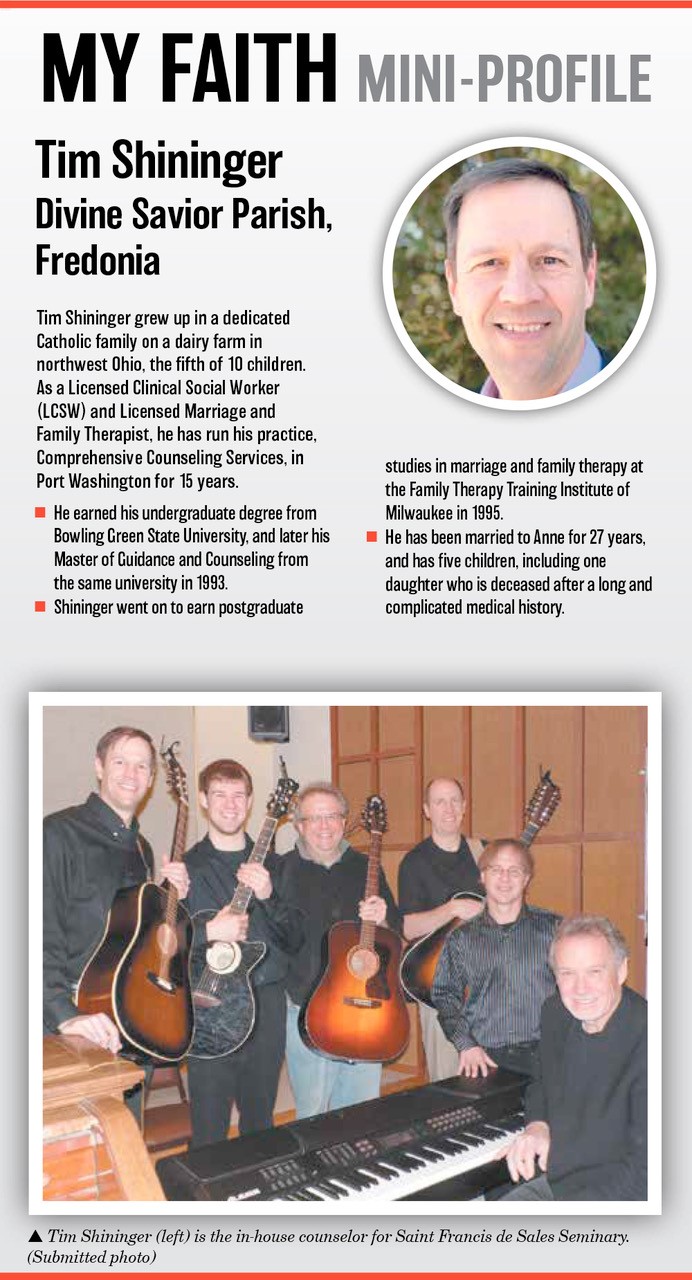Your father was a dairy farmer. Did you help out on the farm a lot growing up?
Oh yes. When I was young, I was responsible for bedding the calves on the farm and helped with some of the milking as I got older and helped with some of the field work, bailing hay. It was a way of life and a lot of our family experience was done working together on the farm. It created a strong work ethic in my life.
You mentioned your family of origin is musical. Did you all play together?
Yes, we would sing together and now when we get together, it’s an annual tradition that we sing. My family of origin is now about 80 people strong and at Christmas, my parents always require us to sing a few verses of Silent Night. All of my sons and daughter sing; they were in musicals in school and a couple of them have joined us in the choir at church. It’s quite amazing.
Growing up in such a strong Catholic family, did you ever discern the priesthood?
Not significantly. My younger brother is a legionary priest in California and has been for about 15 years, Fr. Brian Shininger. I also have an older sister who spent several years as a novitiate, discerning the call to religious life. It certainly wasn’t unheard of in our family to discern that vocation.
What made you want to go into counseling?
It actually came through a talk we had in CCD. A man came to talk to us about his work and experience and that, coupled with the fact that I felt very fortunate growing up in the family I had, and I realized that I wanted to help others who weren’t born into such a fortunate situation.
How does your work impact your faith?
It’s been a growth process in understanding the importance of a healthy integration of a body, mind and soul. I’ve always looked at my faith as being part of my work, and known that emotional and psychological health is so important to our spiritual life and our lives as a whole not only for my patients, but really for myself, too.
You work as the in-house counselor for Saint Francis de Sales Seminary. What brought you there?
They sought me out. I think they knew of my work in the archdiocese as being a Catholic psychotherapist; so I’ve been there about three years. It’s been a great learning experience to see how the dimension of human formation in their discernment and vocation toward the priesthood is so important to their growth and maturity. I’m available to the seminarians if they’re struggling with a particular emotional or psychological struggle. I teach a couple of the formation classes, too.
What do you enjoy most about working with the seminarians?
I think seeing them grow and mature and have an understanding of being more holy integrated, their emotional and psychological well being. It’s wonderful to see the support they see from their brother seminarians and the support staff there.
How has working there changed you?
It’s made me more prayerful and had me work on my own faith life and prayer life. I’ve found myself working on my relationship with our Lord. I’ve seen how important that deep personal relationship is to those seminarians during their formation.
Tragically you lost your oldest daughter. How do you keep her part of your life today?
We lost Monica Rose when she was 3 after a long medical struggle. She had a total of 12 different surgeries and just didn’t recover from the last one. It was so challenging for us in terms of accepting what she went through. When she passed, we had no doubt she was in heaven, and she suffered a lot in her life; so we felt like we could go to her. As Catholics, we believe in the communion of saints. We pray for the intercession of various saints in heaven and have a daughter who we ask to intercede for us, too. As we pray family prayers, we include her in the end saying, “Monica Rose, pray for us.” It’s our way to keep her memory alive for us as well as asking her to pray for us while we’re here on earth. She may not be here in body but she’s here with us in spirit.

